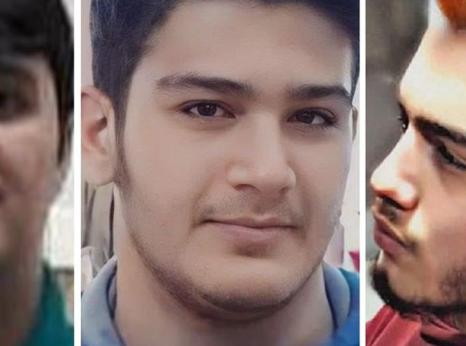Iran: Tortured protesters sentenced to death

Revolutionary Guards agents arrested Javad Rouhi in a violent manner from the street in Noshahr, Mazandaran province, on 22 September 2022 after he was identified in a video that showed him dancing during protests in Noshahr a day earlier. For the next six weeks, the authorities concealed his fate and whereabouts from his family, which amounts to enforced disappearance, a crime under international law. In late October 2022, he was allowed to briefly call his family informing them that he was at an unidentified medical centre. The authorities disconnected the call after a few seconds. In the following weeks, his family continued to desperately search for him including by referring to the central prison in Noshahr. Eventually, in early November 2022, the authorities confirmed that he was held there and in mid-November 2022, they granted a family visit. For the next six weeks and until after the authorities informed him of his death sentence in late December 2022, he was denied contact with his family. It subsequently transpired that following his arrest, he had been held for more than 40 days in solitary confinement at a Revolutionary Guards detention centre known as Shahid Kazemi, which is located within Tir Kola prison in Sari. According to information obtained by Amnesty International, during this period, he was subjected to severe beatings and floggings, including on the soles of his feet and while being tied to a pole, electrically shocked with tasers, exposed to freezing temperatures, and sexually assaulted by having ice put on his testicles for 48 hours. Revolutionary Guards agents also repeatedly pointed a gun to his head and threatened to shoot him if he does not “confess” and “disclose” the name of the “grouplet” (a derogatory term used by the authorities in reference to outlawed opposition groups) with which he had “colluded”. Amnesty International learned that following his torture, Javad Rouhi developed urinary incontinence, digestive complications, mobility issues and speech impairment and was transferred on an emergency basis to a medical centre where he was hospitalized for 48 hours. He also sustained a retear in his rotator cuff, which had been surgically repaired several years earlier. He continues to suffer from severe pain in his back and hips and numbness in his right leg, which have been left untreated and require specialist medical care. His trial took place behind closed doors before Branch 1 of the Revolutionary Court in Sari on 13 December and lasted for less than an hour. During the trial, he told the judge that he had been tortured to give false “confessions”. Despite this, the court relied on his forced “confessions” and refused to order an investigation. In apparent reprisal for speaking out about his treatment in court, immediately after his trial, he was transferred to a Revolutionary Guards detention centre in Sari, Mazandaran province, and held there in solitary confinement for around two weeks. In late December 2022, he was returned to the central prison in Noshahr, where he remains.
Revolutionary Guards agents arrested Arshia Takdastan in Noshahr on 24 September 2022 and transferred him the next day to Shahid Kazemi detention centre in Sari. According to information obtained by Amnesty International, there, he was held in solitary confinement for 28 days and repeatedly subjected to beatings and death threats, including through having a gun pointed at his head and being told that he would be shot dead if he did not “confess” in front of a video camera. The interrogators also threatened to detain and torture his father if he did not “cooperate”. The authorities concealed his fate and whereabouts from his family for 18 days, which amounts to enforced disappearance. In its verdict, which has been reviewed by Amnesty International, the Revolutionary Court cited as evidence of “enmity against God” a text message sent by Arshia Takdastan to Iran International, a media outlet outside Iran, wherein, according to the verdict, he expressed appreciation to the media outlet for “standing behind the people” and asked them to “keep encouraging the people so that the Islamic Republic is suppressed”.
Mehdi Mohammadifard went into hiding on 1 October 2022 after being summoned for interrogations by Revolutionary Guards. He was located and arrested in the early hours of the morning on 2 October 2022. According to information obtained by Amnesty International, his arrest was carried out in a violent manner involving severe beatings and pushing him to the ground, as a result of which he sustained a broken nose. The organization learned that following his arrest, he was held for a week in solitary confinement in a cell infested with mice and cockroaches, and during this period, he was subjected to torture and other ill-treatment to “confess” including through severe beatings and suspension upside down. He was also subjected to rape as defined in international criminal law, namely: non-consensual vaginal, anal or oral penetration of a sexual nature of the body of another person with any bodily part or object. The organization learned that as a result of rape, he suffered anal injuries and rectal bleeding and was transferred on an emergency basis to a hospital outside prison. He was returned to detention the next day and before he had recovered. Amnesty International was not able to ascertain the location of the detention facility where he was held during the investigation period. He is currently held in the central prison in Noshahr. He was not allowed any visits from his family until after he was sentenced to death in December 2022.
- Downloads
- Download UA in PDF
- Download UA in Word